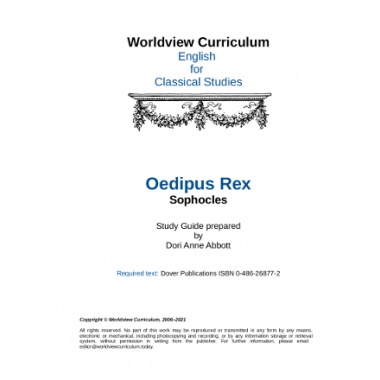Oedipus Rex
Number of lessons: 4; compatible text for study guide: Dover Publications ISBN 0-486-26877-2 (you may order the text below). Guide prepared by Dori Anne Abbott.
$0.00
Order text here
WHO needs soap operas when there are Greek tragedies to read? This story has all the excitement of a modern television drama—power, envy, evil prophecies fulfilled. Read this drama when you have a couple hours of uninterrupted time so you can really understand what is happening. The ending will surprise you.
Œdipus Rex (the King) is the first of a trilogy of plays about Œdipus and his children. The other two plays are Œdipus at Colonus, which continues the sufferings of Œdipus, and Antigone, which is about the daughter of Œdipus, who violates a decree of the king in order to fulfill her religious obligations.
The central rhetorical issue in Œdipus Rex is whether Œdipus and Jocasta are innocent victims of a terrible fate, or whether both son and mother are fully aware of their actions. If the former position is true, then there is no moral or religious lesson that we can learn. If the latter position is correct, then Œdipus is deserving of any punishment and misery that comes his way. As you read this play, gather evident that supports both positions.
While the play does not go into the confrontation between Œdipus and the Sphinx, this event is important for the background of Œdipus’s becoming the king of Thebes. In Greek mythology, the Sphinx was a terrible monster—half woman and half lion. She terrorized Thebes by planting herself at its gates, and asking everyone who passed by the following riddle: “What animal goes on four feet in the morning, two in the afternoon, and three at night?” Anyone who could not answer the riddle was strangled immediately by the monster. The only man in Thebes who answered the riddle correctly was the newcomer Œdipus; so the people of the city made him their king, after learning that their former king, Laius, had been killed by bandits.
Œdipus Rex is one of the best of all of the Greek tragedies. Therefore, sit back and enjoy the story of a man who had everything...or did he? As my grandfather used to say, “Life is a long situation!”
WHO needs soap operas when there are Greek tragedies to read? This story has all the excitement of a modern television drama—power, envy, evil prophecies fulfilled. Read this drama when you have a couple hours of uninterrupted time so you can really understand what is happening. The ending will surprise you.
Œdipus Rex (the King) is the first of a trilogy of plays about Œdipus and his children. The other two plays are Œdipus at Colonus, which continues the sufferings of Œdipus, and Antigone, which is about the daughter of Œdipus, who violates a decree of the king in order to fulfill her religious obligations.
The central rhetorical issue in Œdipus Rex is whether Œdipus and Jocasta are innocent victims of a terrible fate, or whether both son and mother are fully aware of their actions. If the former position is true, then there is no moral or religious lesson that we can learn. If the latter position is correct, then Œdipus is deserving of any punishment and misery that comes his way. As you read this play, gather evident that supports both positions.
While the play does not go into the confrontation between Œdipus and the Sphinx, this event is important for the background of Œdipus’s becoming the king of Thebes. In Greek mythology, the Sphinx was a terrible monster—half woman and half lion. She terrorized Thebes by planting herself at its gates, and asking everyone who passed by the following riddle: “What animal goes on four feet in the morning, two in the afternoon, and three at night?” Anyone who could not answer the riddle was strangled immediately by the monster. The only man in Thebes who answered the riddle correctly was the newcomer Œdipus; so the people of the city made him their king, after learning that their former king, Laius, had been killed by bandits.
Œdipus Rex is one of the best of all of the Greek tragedies. Therefore, sit back and enjoy the story of a man who had everything...or did he? As my grandfather used to say, “Life is a long situation!”

